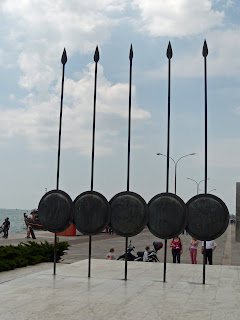Start of Philip’s reign (359 BC)
At twenty-four, Philip II became king of Macedonia. That is only four years older than Alexander was when he succeeded his father, but the Macedonia he inherited was a coherent one whereas Philip was facing a formidable and nearly impossible task. He had to set his priorities, and quickly too.
 The most urgent threat came from the Illyrians who had just defeated his brother, and it seems that Philip managed some treaty which may have included his marriage with Audata (Philip’s second wife), King Bardelys’ granddaughter. He then turned towards the Paeonians, whom he corrupted with gifts and generous promises to reach a peace agreement. Athens with Argaeus was a far more serious problem and Philip tricked them into believing he was giving up any claim on Amphipolis by withdrawing his Macedonian soldiers. The Athenians took the bait and their commander stayed in Methone with his troops. Argaeus, meanwhile tried to gain support for his cause from Aegae, the Macedonian capital but left unsuccessfully for Methone also. En route, Philip and a small force surprised him and Argaeus disappeared from the scene. To settle this matter, a peace treaty was signed with Athens, stipulating clearly that Amphipolis no longer would be claimed by Macedonia. Another potential danger however was coming from the Chalcidians who sent an embassy from the main city of Olynthus to Athens for support against Philip, but now that Athens had made peace with Philip they rejected this request.
The most urgent threat came from the Illyrians who had just defeated his brother, and it seems that Philip managed some treaty which may have included his marriage with Audata (Philip’s second wife), King Bardelys’ granddaughter. He then turned towards the Paeonians, whom he corrupted with gifts and generous promises to reach a peace agreement. Athens with Argaeus was a far more serious problem and Philip tricked them into believing he was giving up any claim on Amphipolis by withdrawing his Macedonian soldiers. The Athenians took the bait and their commander stayed in Methone with his troops. Argaeus, meanwhile tried to gain support for his cause from Aegae, the Macedonian capital but left unsuccessfully for Methone also. En route, Philip and a small force surprised him and Argaeus disappeared from the scene. To settle this matter, a peace treaty was signed with Athens, stipulating clearly that Amphipolis no longer would be claimed by Macedonia. Another potential danger however was coming from the Chalcidians who sent an embassy from the main city of Olynthus to Athens for support against Philip, but now that Athens had made peace with Philip they rejected this request.
Within a year, Philip had accomplished the miracle of putting an end to the four major threats that had led to his accession to the throne. The means he used became his trademark: diplomacy, deceit, bribery, and political marriage as well as the lightning speed of his actions. He must have known however that these arrangements were only buying him time. His priority now was to get his kingdom and his army organized.
Philip began by switching the main attacking force of his army from infantry to cavalry as had always been the common practice. He had the cavalry attack the flanks of the enemy lines where his infantry would push down in the centre. He also equipped his infantry with the new sarissa, a long pike of about 4.25 to 5.50 meters long made of cornel wood. The shape of the head was designed in such a way that it would penetrate the armor and the body of the enemy as the previous conventional pikes were meant only to wound the opponent. The cavalry on the other hand was set up in a wedge formation instead of the usual frontal charge lines, which Philip had copied from the Thracians and Scythians. Thus the Macedonian soldiers became highly trained and learned to carry their own arms, equipment, and food – ensuring them to be self-sufficient at all times. Instead of poorly trained farmers and unreliable mercenaries, Philip put in place a full-time army in which the soldiers received regular pay for the first time in history.
 Philip was also keen to introduce new war machines. Where he originally used the mechanically drawn catapults (see Olynthus in 348 BC and Perinthus in 340 BC), he used a new type of siegecraft, the torsion catapult that was far more powerful than the other catapults as proven during the siege of Byzantium in 340 BC.
Philip was also keen to introduce new war machines. Where he originally used the mechanically drawn catapults (see Olynthus in 348 BC and Perinthus in 340 BC), he used a new type of siegecraft, the torsion catapult that was far more powerful than the other catapults as proven during the siege of Byzantium in 340 BC.In addition, he created the new body of Royal Pages, i.e., boys (at least two hundred of them) who entered service at the age of fourteen for four years. They were the personal attendants to the king, meaning that they prepared his horse, accompanied him on his hunting or warring expeditions, and watched over him at night. It was an enviable position which at the same time meant that the boys lived and were educated at the Macedonian court and served as hostages to ensure the loyalty of their families.
No comments:
Post a Comment